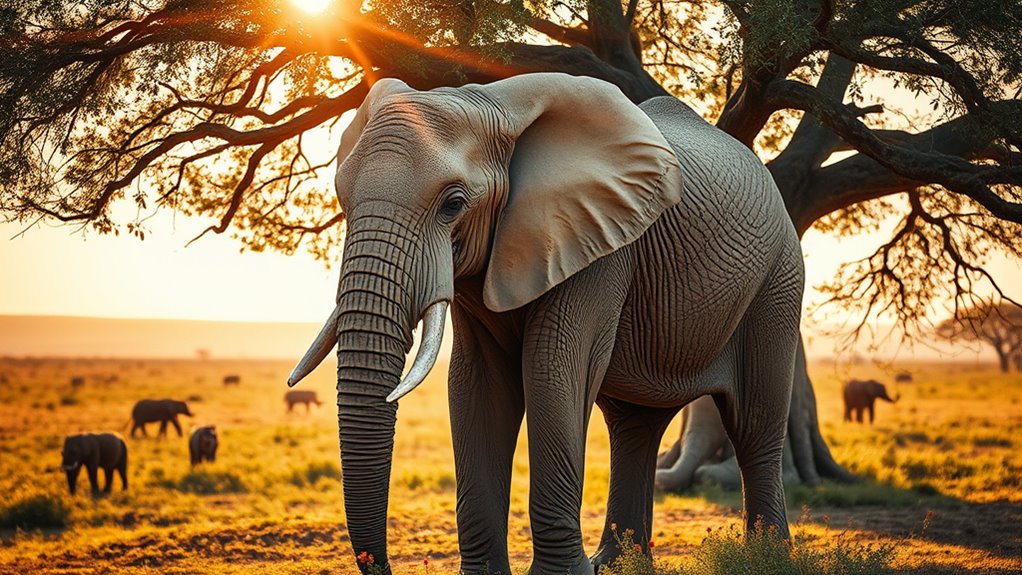Elephants have an incredible memory that helps them survive in the wild. They can recall the locations of food and water, remember past traumas, and recognize family members even after years apart. This remarkable memory is closely linked to their strong emotional ties and social structures, allowing them to communicate effectively and learn from experiences. Their intelligence reflects in how they use memory for survival. Discovering more about their memory could reveal even deeper insights into their behavior.
Key Takeaways
- Elephants have a remarkable long-term memory, crucial for locating food and water sources essential for their survival.
- Their emotional depth allows them to remember significant experiences, including past traumas and the individuals involved.
- Memory retention aids in recognizing family members and enhances social cohesion within herds, vital for their collective survival.
- Elephants communicate complex social information using memory, enabling them to alert others to dangers based on past experiences.
- Understanding elephant memory can inform conservation strategies and reduce human-elephant conflicts, promoting sustainable coexistence.
The Remarkable Memory of Elephants
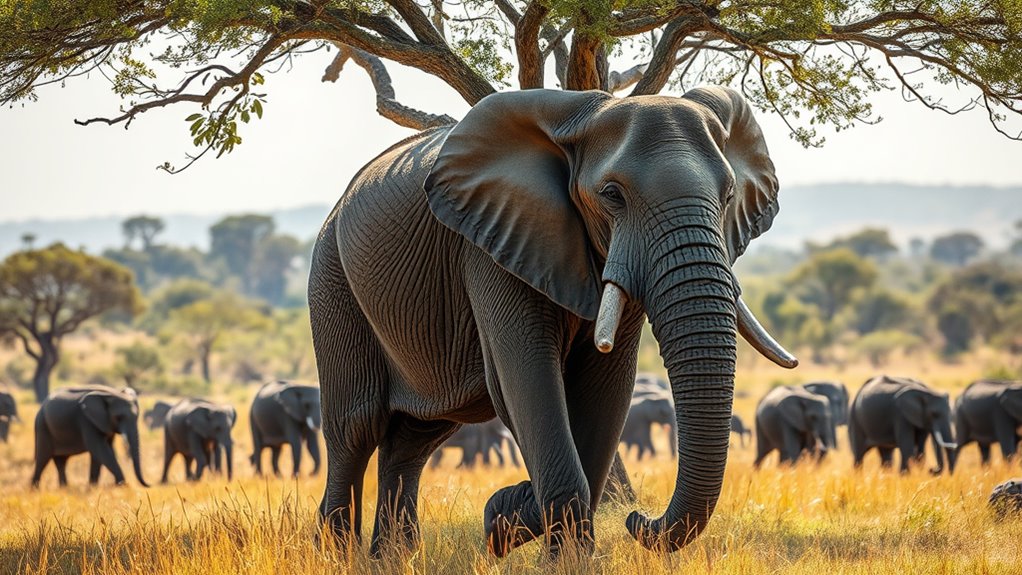
When you think about the intelligence of animals, elephants stand out for their remarkable memory. Their ability to recall locations of food and water is crucial for survival in the wild.
You might be surprised to learn that they can remember past traumas, reacting negatively to clothing associated with those experiences. This shows their emotional memory runs deep.
Anecdotal evidence suggests that elephants can recognize and remember mistreating trainers even after years apart, highlighting their impressive long-term memory.
Research indicates that their memory functions similarly to ours, selectively retaining significant experiences essential for social interactions.
Elephants' memory mirrors ours, highlighting their ability to retain important social experiences for meaningful interactions.
This extraordinary capacity not only aids survival but also strengthens family bonds, allowing them to remember and emotionally respond to their deceased relatives.
Emotional Depth and Grief Behaviors
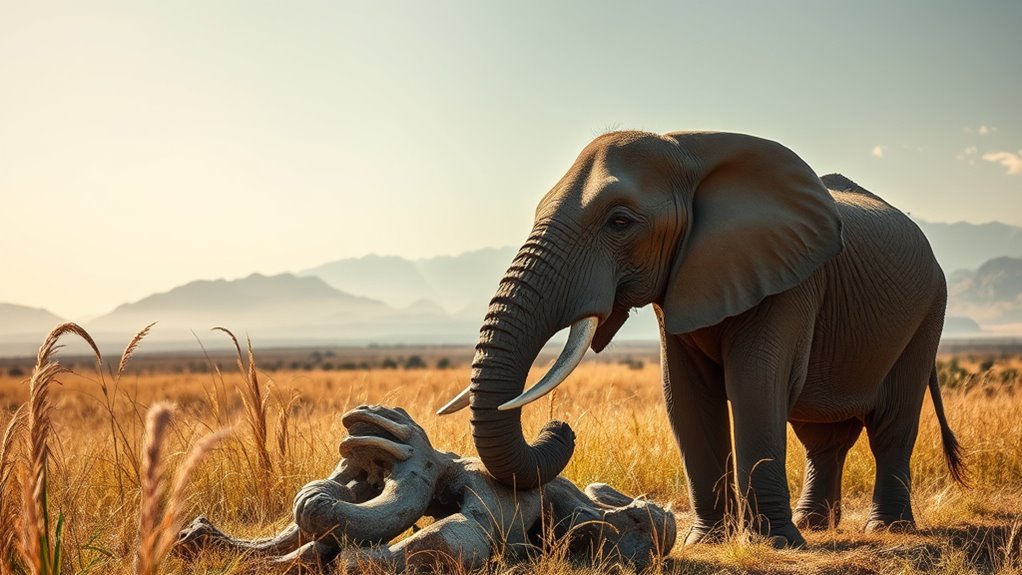
Elephants display profound emotional depth, particularly in their grief behaviors towards deceased relatives. They often touch and caress the remains of their loved ones, showcasing their strong family ties and deep connections.
- They remember not just individuals but also the emotional significance of past experiences.
- Research indicates elephants can hold grudges, reacting negatively to reminders of past traumas.
- Anecdotal evidence shows they can remember mistreating trainers for years after separation.
These behaviors highlight their capacity for complex social interactions and emotional responses, reinforcing familial and social bonds within their herds.
The way elephants navigate grief illustrates their ability to process loss, making their emotional experiences both profound and relatable.
Learning From Past Experiences
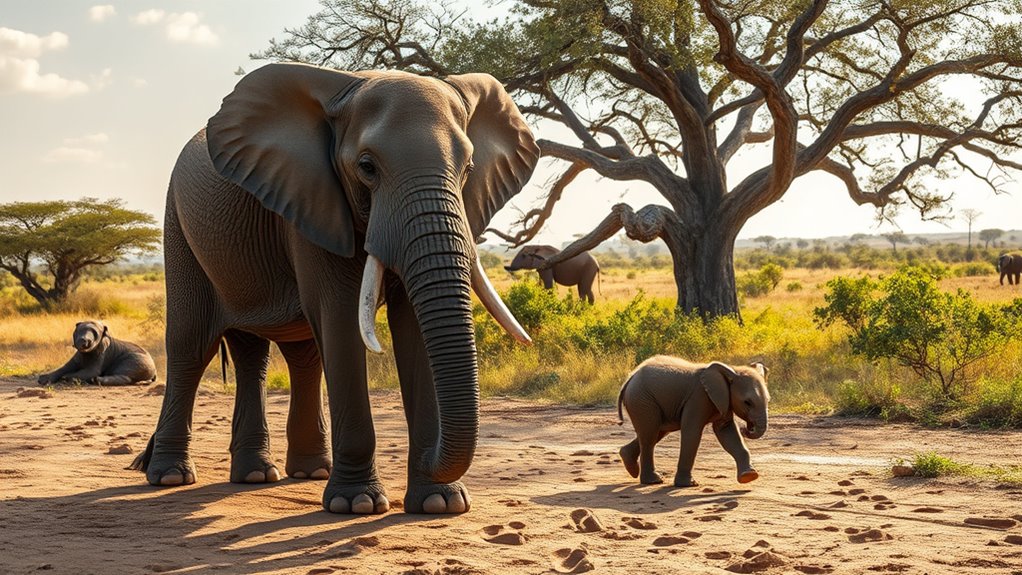
Although they often appear gentle and calm, elephants possess an extraordinary ability to learn from past experiences, which plays an important role in their survival.
Their remarkable long-term memory helps you remember crucial information, like where to find food and the identities of family members. You might be surprised to learn that elephants can hold grudges against those who mistreat them, even recognizing clothing linked to negative encounters.
Additionally, they show a deep connection to their deceased relatives, recalling familiar scents and objects. Elder female elephants, in particular, use their superior memory to guide herds, alerting them to dangers and important resources.
This incredible memory not only aids individual elephants but strengthens their social bonds and guarantees their survival.
Social Structure and Memory Retention

In the intricate social structure of elephant herds, memory retention plays an essential role in recognizing family members and maintaining strong bonds. Female elephants usually stay with their maternal families for life, enhancing their collective memory of survival strategies.
During droughts, different family groups unite, showcasing how shared memories aid in resource management.
- Elder female elephants recall familiar dangers, ensuring the herd's safety.
- Memory strengthens the connections between family members, fostering social cohesion.
- Their ability to remember relationships and hierarchies enhances communication within the herd.
These factors illustrate that memory isn't just a mental exercise for elephants; it's critical for their survival and the stability of their social structure.
Communication and Memory Links
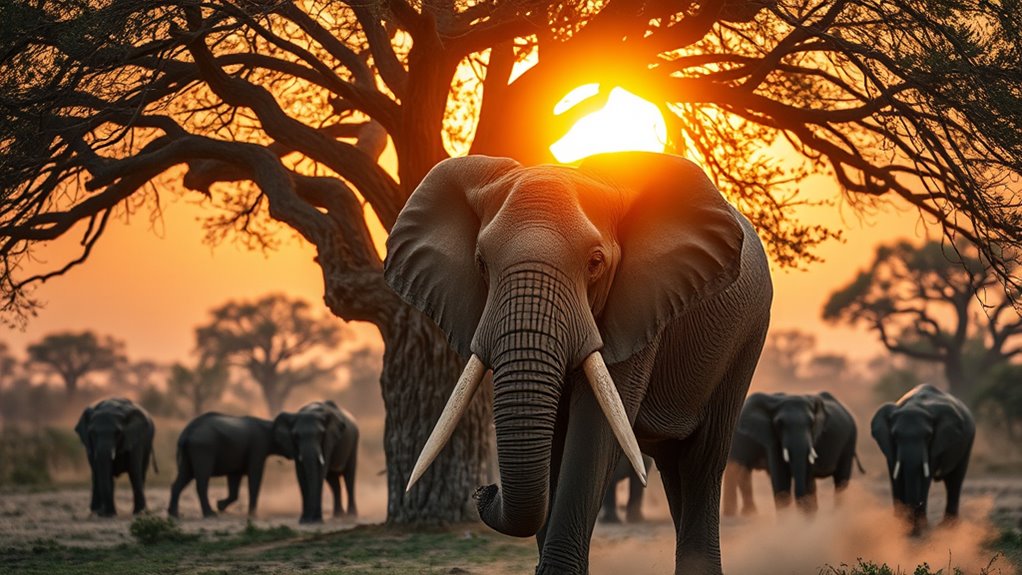
Memory greatly enhances communication among elephants, allowing them to convey complex social information. They use over 70 vocalizations and 160 visual/tactile signals to maintain social bonds and share memories of past experiences. Their long-term memory helps them recognize individuals and recall crucial survival information, like where to find water.
| Communication Method | Memory Influence | Social Impact |
|---|---|---|
| Vocalizations | Recognition of individuals | Strengthens social bonds |
| Visual Signals | Association with events | Facilitates resource sharing |
| Tactile Signals | Emotional responses | Enhances herd cohesion |
Matriarchs lead the herd using their superior memory, alerting others to dangers. This intertwining of memory and communication is essential for the safety and unity of the group.
Intelligence Reflected in Memory Capabilities

As elephants navigate their complex social environments, their remarkable intelligence is vividly reflected in their memory capabilities. With the largest brains of all mammals, averaging 10.5 pounds, elephants demonstrate exceptional cognitive skills. Their encephalization quotient (EQ) of 1.88 indicates intelligence levels comparable to some primates.
- Female elephants often serve as matriarchs, showcasing superior memory to help guide herds.
- Scientific studies reveal elephants can recall past experiences and recognize family members.
- Their highly developed olfactory region helps them remember crucial information, like food locations.
This intricate memory system not only showcases their intelligence but also plays an essential role in their social structures and interactions, enhancing their survival in challenging environments.
Memory and Survival Strategies
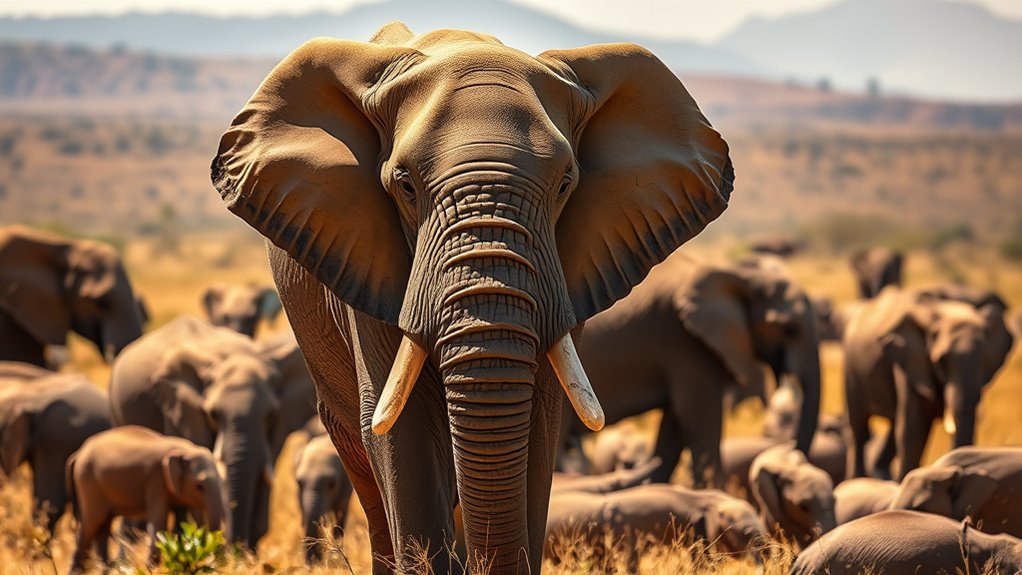
Memory plays an essential role in survival strategies for many animals. You might be surprised to learn how some species hold grudges, recalling injuries or threats, while others excel at remembering resource locations crucial for their well-being.
This ability to store and recall information not only helps them avoid danger but also guarantees they can thrive in their environments.
Grudges and Injury Recall
While many animals rely on instinct for survival, elephants demonstrate a remarkable ability to remember past injuries and hold grudges, which considerably shapes their interactions with others.
Their memories not only help them recall specific negative experiences but also influence their behavior toward those who've harmed them.
- Elephants can recognize former trainers after years apart, showing long-term emotional memory.
- They exhibit grief behaviors towards deceased relatives, indicating deep emotional processing.
- Their memories play a crucial role in coping with habitat encroachment and potential dangers.
These traits highlight how elephants' memory is intricately linked to their survival strategies, allowing them to navigate challenges in their environments effectively.
Memory for Resource Locations
When faced with challenging environments, elephants rely on their exceptional long-term memory to locate essential resources like food and water. This remarkable ability allows them to navigate vast landscapes and remember significant survival information for many years.
During droughts, multiple family groups often gather, relying on their memories to share available resources. Matriarchs, with their wealth of experience, lead herds to these important locations, ensuring everyone's survival.
Their memory for resource locations is deeply intertwined with their social structures, emphasizing the importance of community in times of scarcity. Understanding how elephants remember these locations informs conservation strategies, highlighting the need to protect their habitats and migratory routes, which are essential for their ongoing survival in changing environments.
The Role of Matriarchs in Memory Sharing
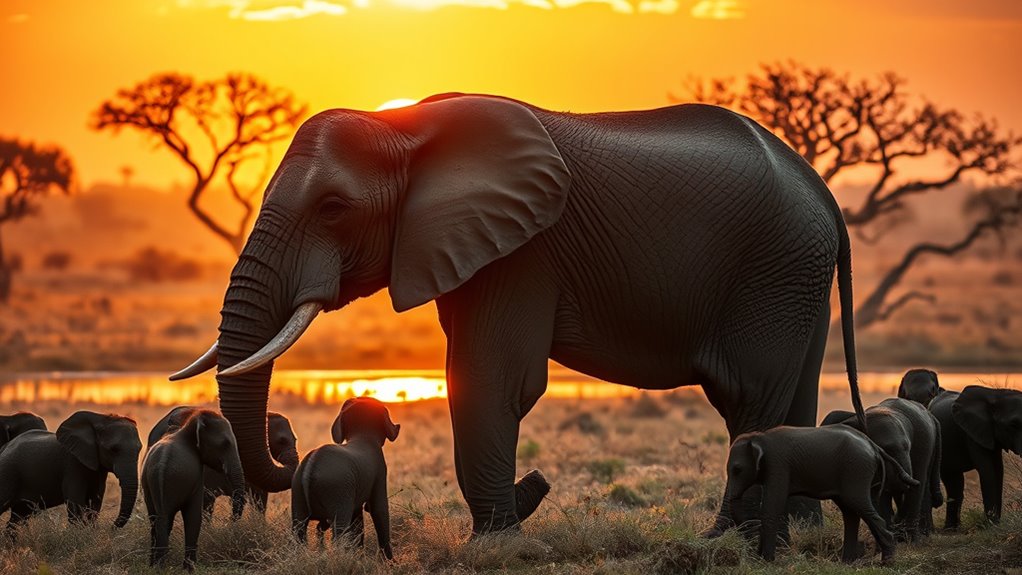
Matriarchs hold an essential position in elephant herds, as their wealth of experience directly influences the survival of the group.
These elder females share invaluable knowledge that keeps the herd thriving.
- They remember food and water sources, guiding their families during tough times.
- Their superior memory alerts the herd to familiar threats, enhancing safety.
- Matriarchs strengthen social bonds through complex communication, ensuring everyone stays connected.
Conservation Implications of Elephant Memory

Understanding the intricate memory capabilities of elephants can greatly shape conservation strategies.
By recognizing how elephants navigate their habitats and recall food and water sources, you can prioritize protecting these essential resources, especially during droughts. Awareness of their ability to remember past interactions helps design humane treatment protocols and reduce human-elephant conflicts.
Considering their emotional and memory-driven social structures fosters community engagement, leading to sustainable coexistence solutions. Additionally, educating local populations about elephant memory promotes understanding and tolerance, which ultimately aids in protecting these magnificent creatures and their habitats.
Frequently Asked Questions
Why Does an Elephant Never Forget?
An elephant never forgets because it possesses an extraordinary memory system, allowing it to recall essential information about food, water sources, and social dynamics.
You'll find that their large brains and high intelligence help them remember past experiences, including traumatic ones.
This memory retention enables elephants to learn from their encounters, navigate their environments effectively, and maintain strong social bonds, ensuring their survival in the wild and within their herds.
Is It True That Elephants Don't Forget?
You might think it's just a saying, but it's true—elephants don't forget.
Imagine an elephant roaming vast savannas, recalling every watering hole and familiar face from years past. These gentle giants possess remarkable memory skills, allowing them to remember both positive experiences and painful moments.
Their brains, the largest on land, help them retain essential survival information, making their memory a significant part of their social structure and existence.
Why Do Elephants Never Forget Ted Talk?
When you watch the TED talk on why elephants never forget, you'll discover fascinating insights into their memory.
The speaker highlights how elephants recall essential experiences and recognize individuals, showcasing their intelligence.
You'll learn about their remarkable ability to navigate social structures and how past interactions shape their behavior.
This talk emphasizes the emotional depth of elephants, illustrating that their memories play a significant role in their survival and relationships within herds.
Why Do Elephants Have Such a Good Memory?
Did you know that elephants can remember locations and individuals even after 20 years? Their incredible memory stems from their large brains, which are designed for complex social interactions and survival.
You'll find that older female elephants lead their herds by recalling essential information, alerting them to dangers. Their advanced olfactory senses also play a huge role, allowing them to recognize familiar scents and enhance their memories even further.
Conclusion
In the grand tapestry of nature, elephants weave threads of memory that bind their families together. Their remarkable ability to remember not only shapes their social structures but also guides their survival. As matriarchs pass down knowledge, they guarantee the survival of their kin, much like a wise elder sharing stories around a fire. Understanding this incredible memory can deepen our appreciation for these gentle giants and highlight the importance of conserving their habitats for future generations.
